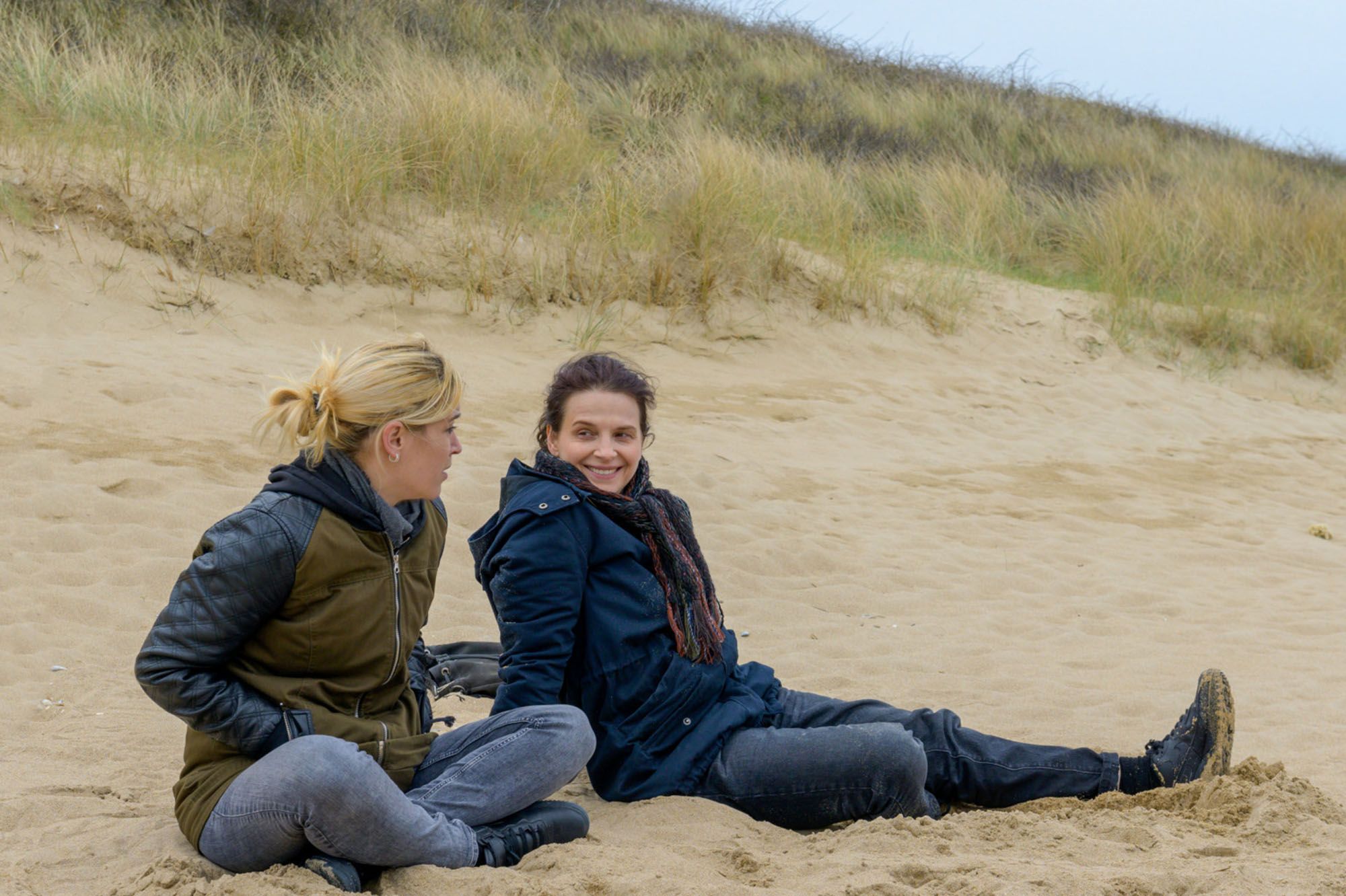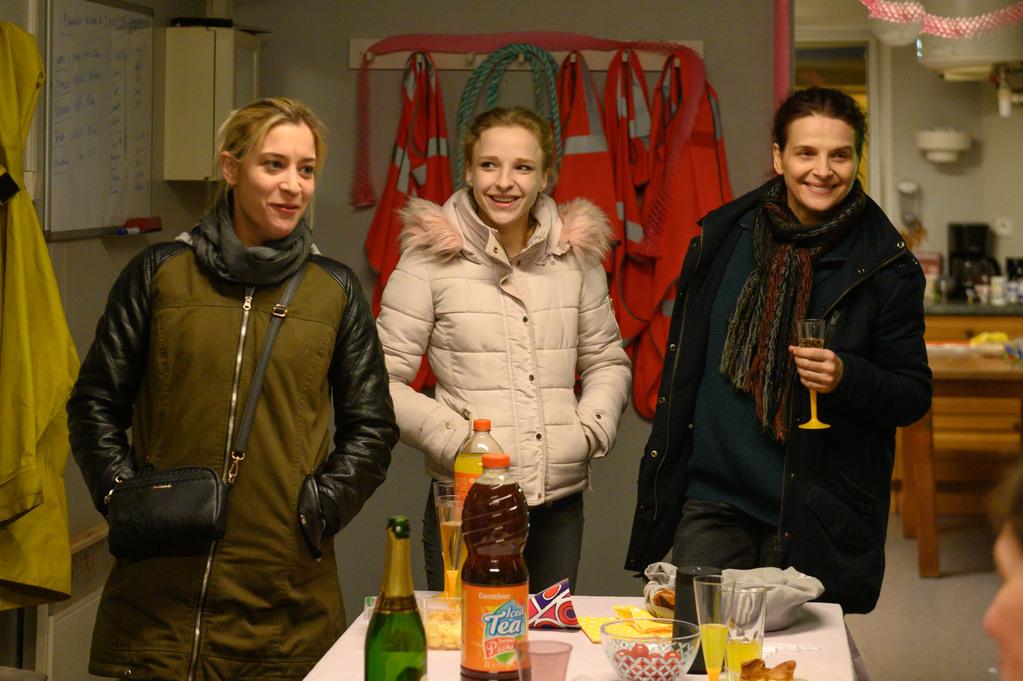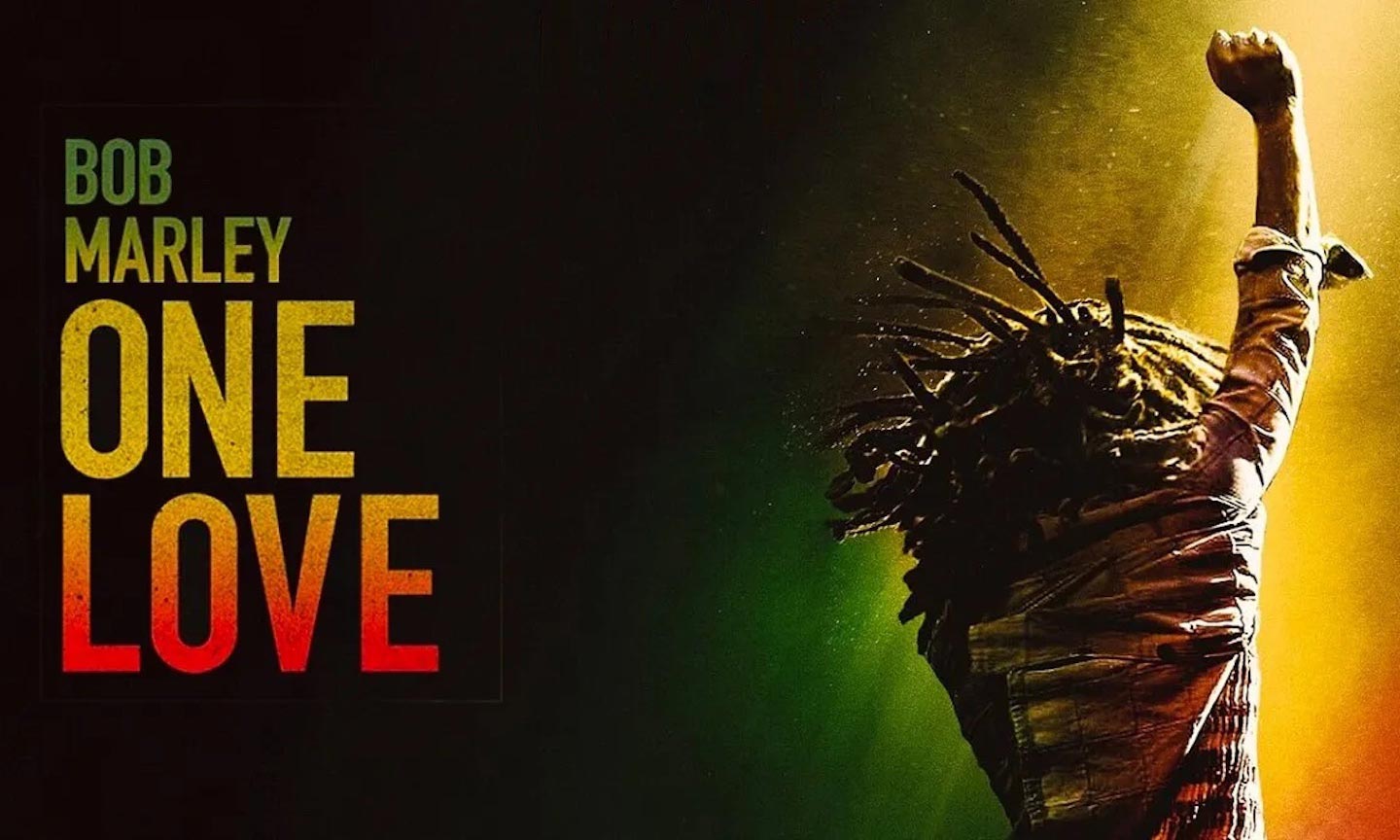The writer signs his return to the cinema, with the adaptation of the Quai de Ouistreham by Florence Aubenas. If it takes up the documentary aspect, its aim also extends to the work of the author and is a mise en abyme of the condition of writer. But isn't the contribution of fiction within a social pamphlet counterproductive, even nonsensical? Response elements.
Ouistreham : almost documentary, never social
For more than 10 years now, the brutality of the Quai de Ouistreham has resonated in the literary circle. Its author, Florence Aubenas, a journalist known for her precise pen in Kosovo , Afghanistan or Iraq, wrote it as an autobiographical account. The objective, to go to a region stigmatized by the 2008 crisis to relate the economic, social and human misery. She chose the Norman land and the agglomeration of Caen, where she invented a young divorced life, without experience and ready to do the slightest precarious job to survive. His experimentation will take him to the ferry that joins Ouistreham and Portsmouth, also called " hell" for its inhumane working conditions. This investigation, with strong, crude and deeply social words, has become a mirror of an era never before gone. Where the poverty of the territories is a sad reality, where subsistence is a destiny of life, instead of the last resort. Many studios wanted to transform this essay on film. Florence Aubenas has always fought against. It took the investment and all the persuasion of Juliette Binoche with the writer to accept the project. The two women appoint a filmmaker who accepts this nomination without really understanding: Emmanuel Carrère. Former film critic for Positif and Télérama, novelist and documentary filmmaker, the man is curiously all found for this tedious exercise. In his literary work (Other lives than mine, Yoga), the author does not hesitate to put in abyss (and to be, to question) his condition as a writer, by projecting himself into his stories. He even decided to adapt his own work of fiction successfully, with La Moustache. In Ouistreham, it is not a question of a social documentary or a fictionalized transposition, but rather of the fusion of these two concepts, through a very realistic film, but which takes a lot of comfort compared to the book.  Ouistreham starts however like the latter. Florence Aubenas becomes here Marianne Winckler, presented as a writer, not really as a journalist. The fifty-year-old settles in a shabby piaule, barely larger than a storage room. The story begins with the reading of his own text on computer, explaining his desire to be as close as possible to real life, to be in contact with "real" misery. During the next 100 minutes, Marianne will follow her wanderings to survive, disguising herself in the middle of a proletarian social body that was hitherto unknown to her.
Ouistreham starts however like the latter. Florence Aubenas becomes here Marianne Winckler, presented as a writer, not really as a journalist. The fifty-year-old settles in a shabby piaule, barely larger than a storage room. The story begins with the reading of his own text on computer, explaining his desire to be as close as possible to real life, to be in contact with "real" misery. During the next 100 minutes, Marianne will follow her wanderings to survive, disguising herself in the middle of a proletarian social body that was hitherto unknown to her.
A careful transposition in the form
To transcribe this odyssey, Emmanuel Carrère made all exaggerations of style. The camera shots are of a simplicity and a confounding clarity. A lot of fixed shots, with very tight frames to (literally) stick to the human. To this is added an aesthetic work almost documentary. The filmmaker admits in several interviews, he wanted to be "faithful" to this point of view adopted by Florence Aubenas in her book. From this point of view, Ouistreham is a precise film in the elements it deigns to show us. Attention has been paid to the situations and sets, revealing a beautiful symbolic duality: the capture seems as fair as it is hypocritical, Juliette Binoche being not very credible as a surface technician for start-up premises as dirty as the mind of their manager. But the gesture is legitimate. He takes up a factual detail: Florence Aubenas was no more gifted for the household than one of the greatest French actresses. There is also the idea of Emmanuel Carrère's mise en abyme on the role of the writer and the journalist. How far does he have to go to accurately relate the facts? Does legitimacy necessarily come from experience? Or worse: can we really relate to a class problem that is not ours? Defining himself as bourgeois, Carrère de facto has an ideal playground and this reading grid is quite relevant to the vision of the film.  Especially since the director makes clear choices throughout the latter. Exit thus primordial scenes of the book, such as the demonstration of the workers in Caen (perhaps too insane and out of budget), the accumulation of odd jobs that punctuated the narrative becomes here small scenes of transition or the sequences on the silver galley (with black on white numbers) obscured. Worse (or why not, question of approach), the meaning of some passages are modified. In the Quai de Ouistreham, the ferry's cleaning team accommodates an express departure drink for one of its members, thanked by their employer. Ouistreham reverses the balance of power and shows a happy team, quietly celebrating the future new work of this young woman who will have made her last tour in the ferry.
Especially since the director makes clear choices throughout the latter. Exit thus primordial scenes of the book, such as the demonstration of the workers in Caen (perhaps too insane and out of budget), the accumulation of odd jobs that punctuated the narrative becomes here small scenes of transition or the sequences on the silver galley (with black on white numbers) obscured. Worse (or why not, question of approach), the meaning of some passages are modified. In the Quai de Ouistreham, the ferry's cleaning team accommodates an express departure drink for one of its members, thanked by their employer. Ouistreham reverses the balance of power and shows a happy team, quietly celebrating the future new work of this young woman who will have made her last tour in the ferry.
Where is the real misery?
At first glance (or if you have not read Aubenas' book), these script choices do not disturb the viewing. The feature film finds its rhythm through effective sequences although a little repetitive (the ferry taking up too much space) and plays a lot on the relationships between the characters. Something that the author had less related, relaying with distance without allowing herself emotions, journalistic restraint obliges, to remain master of her words. By pure radicality, Emmanuel Carrère opposes it and invents the character of Christèle (formidable Hélène Lambert, former cleaner and non-professional actress), who becomes the best friend of Marianne Winckler. She has children, dreams of winning the lottery for "a pair of pumps at 300 € and a tattoo", tube her cigarettes to save. This scripted addition (in collaboration with his partner, Hélène Devynck, a recent witness in the PPDA case), the filmmaker makes it the heart of his film. The adage is that what is opposed attracts and in the following case, the meeting between Marianne and Christèle is an emotional and human boom that will break the look of the other on his respective lives.  However, this is the big question that remains in Ouistreham. Faced with the facts, Emmanuel Carrère seems to prefer the human to justify the symbolic nature of Marianne's fight. Moreover, the few elements taken as they are from the book, apart from its decorum, are small moments of life, perhaps the most endearing: Cédric (Philippe for Aubenas) who unpacks his flirting techniques and his dreams of pizza truck or the household training with a course on the single-brush cleaner nicknamed "the Beast". In the end, the only potential plot point (will she get grilled or not?) is evaded after 10 minutes of film (and even in the trailer), since Marianne is unmasked by her Pôle Emploi advisor. Similarly, the conclusion of the novel (a proposal for a permanent contract, synonymous with the end of the experiment) becomes quite different and even a little ridiculous. With Ouistreham, the filmmaker is interested in something else, by showing a more human, but necessarily less relevant, variation of a social bomb. Can we romanticize poverty and misery, while making a documentary rendering? According to Carrère, it is yes. Thus, he favors the almost adulterated emotion, when he could have given birth to a real call to revolt. There is enough to see an interesting work of mise en abyme, but a failure in terms of social representation. A height for such a subject and especially, compared to the book he adapts. https://www.youtube.com/watch?v=yloQFI8hSd4
However, this is the big question that remains in Ouistreham. Faced with the facts, Emmanuel Carrère seems to prefer the human to justify the symbolic nature of Marianne's fight. Moreover, the few elements taken as they are from the book, apart from its decorum, are small moments of life, perhaps the most endearing: Cédric (Philippe for Aubenas) who unpacks his flirting techniques and his dreams of pizza truck or the household training with a course on the single-brush cleaner nicknamed "the Beast". In the end, the only potential plot point (will she get grilled or not?) is evaded after 10 minutes of film (and even in the trailer), since Marianne is unmasked by her Pôle Emploi advisor. Similarly, the conclusion of the novel (a proposal for a permanent contract, synonymous with the end of the experiment) becomes quite different and even a little ridiculous. With Ouistreham, the filmmaker is interested in something else, by showing a more human, but necessarily less relevant, variation of a social bomb. Can we romanticize poverty and misery, while making a documentary rendering? According to Carrère, it is yes. Thus, he favors the almost adulterated emotion, when he could have given birth to a real call to revolt. There is enough to see an interesting work of mise en abyme, but a failure in terms of social representation. A height for such a subject and especially, compared to the book he adapts. https://www.youtube.com/watch?v=yloQFI8hSd4







































